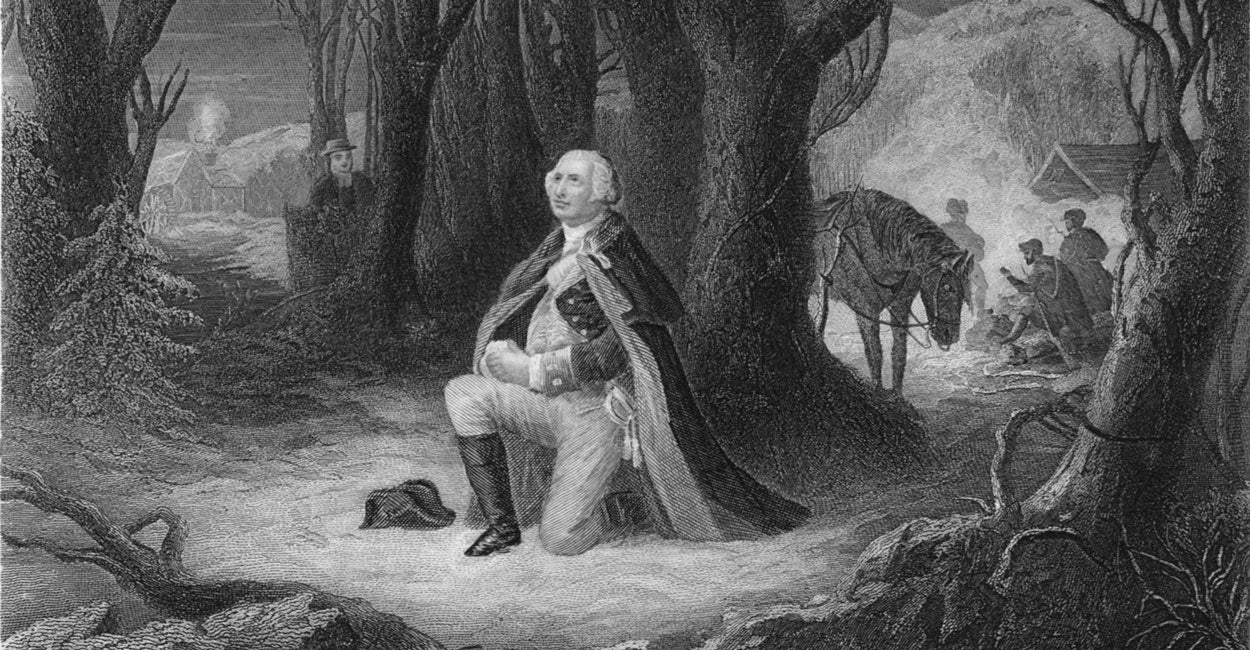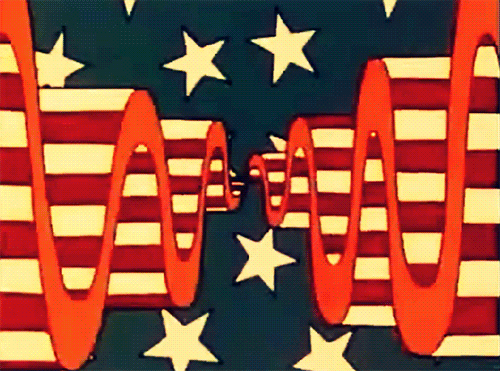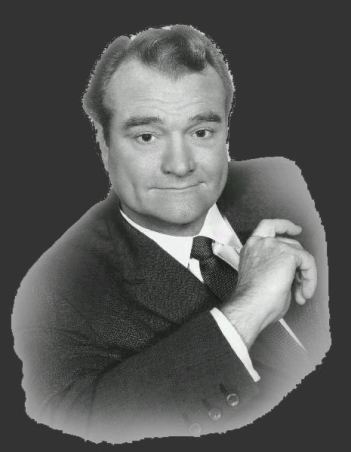 |
Presidential Prayers: Turning to God in Times of Need
Since the founding of the Republic, Americans have appealed to God in times of crisis. From George Washington to Donald Trump, our presidents have been no exception.
One of Ronald Reagan’s favorite images was that of Gen. George Washington kneeling in the snow at Valley Forge, when the American cause seemed hopeless. That image, Reagan said, “personified a people who knew it was not enough to depend on their own courage and goodness; they must also seek help from God, their Father, and their Preserver.”
Abraham Lincoln turned to God time and again. His Emancipation Proclamation, for example, ends with the words:
And upon this act, sincerely believed to be an act of justice, … I invoke the considerate judgment of mankind, and the gracious favor of Almighty God.
Lincoln captured the necessity of our leaders’ having a relationship with God when he said: “I would be the most foolish person on this footstool earth if I believed for one moment that I could perform the duties assigned to me without the help of one who is wiser than all.”
In war and peace, our presidents have called upon the Almighty, as did Franklin D. Roosevelt in his address to Congress asking for a declaration of war against Japan after the infamous attack on Pearl Harbor: “With confidence in our armed forces, with the unbounding determination of our people, we will gain the inevitable triumph, so help us, God.”
In announcing that D-Day had arrived and the invasion of France was underway, Roosevelt closed his national radio address with a heartfelt prayer that conceded the certain cost of the operation:
Almighty God: Our sons, pride of our nation, this day have set upon a mighty endeavor, a struggle to preserve our Republic, our religion, and our civilization, and to set free a suffering humanity. Some will never return. Embrace these, Father, and receive them, Thy heroic servants, into Thy Kingdom.
One of the most famous invocations of World War II was the weather prayer requested by Gen. George Patton, eager to advance against the Germans in the critical Battle of the Bulge but blocked by unrelenting winter weather. The Rev. James O’Neill prayed:
Almighty and most merciful Father, we humbly beseech Thee, of Thy great goodness, to restrain these immoderate rains with which we have had to contend.Grant us fair weather for battle. Graciously hearken to us as soldiers who call upon Thee that, armed with Thy power, we may advance from victory to victory, and crush the oppression and wickedness of our enemies and establish Thy justice among men and nations.
A miracle of miracles, the snow stopped; the skies cleared, and Patton’s 3rd Army, unleashed, went on to crush the Germans and help end the war in Europe.
Thousands of miles away in the South Pacific, God also was invoked. After Japan had unconditionally surrendered, President Harry Truman declared Aug. 19, 1945, to be a day of prayer and acknowledged God’s essential role:
[Our victory] has come with the help of God, who was with us in the early days of adversity and disaster, and Who has now brought us to this glorious day of triumph. Let us give thanks to Him, and remember that we have now dedicated ourselves to follow in His ways to a lasting and just peace and to a better world.
Prayer is integral to America. A National Day of Prayer was first proposed by the Second Continental Congress in 1775, again by Lincoln in 1863, and then made a national tradition in 1988 by Reagan, who designated the first Thursday of May as a National Day of Prayer.
Reagan recognized God’s enduring presence in our nation’s history and made no secret of it.
In May 1982, for example, the 40th president proclaimed: “Through the storms of revolution, Civil War, and the great world wars as well as during times of disillusionment and disarray, the nation has turned to God in prayer for deliverance. We thank Him for answering our call, for, surely, He has.”
In the wake of the terrorist attacks on the World Trade Center and the Pentagon in September 2001, a somber President George W. Bush, speaking from the Oval Office, asked the nation to pray for the victims:
I ask for your prayers for all those who grieve, for the children whose worlds have been shattered, for all whose sense of safety and security have been threatened. And I pray they will be comforted by a Power greater than any of us, spoken through the ages in Psalm 23: ‘Even though I walk through the valley of the shadow of death, I fear no evil for you are with me.’
Our current president has followed his predecessors in confessing his belief in God’s saving power.
When the coronavirus pandemic hit America, Trump quickly proclaimed March 14 to be a National Day of Prayer. Reminding us that “no problem is too big for God to handle,” the president said:
As one nation under God, we are greater than the hardships we face, and through prayers and acts of compassion and love, we will rise to this challenge and emerge stronger and more united than ever before.
One constant in our presidents has been their acknowledgment of the need for prayer in our lives.
Barack Obama, that most self-contained of all presidents, asserted at a National Prayer Breakfast held as the nation struggled to emerge from the Great Recession: “What better time than these changing tumultuous times to have Jesus standing beside us, steadying our minds, cleansing our hearts, pointing us toward what matters?”
Today, as we face an increasingly deadly national epidemic, a National Day of Prayer is a powerful idea.
An even more powerful idea is a daily prayer, by individuals of all faiths, to a loving God who we know will hear us and keep us and give us peace.
Source:
I have to say the first time watching this made me cry.
Pay close attention to his last line because what he said years ago is now happening and it is very sad.
Pay close attention to his last line because what he said years ago is now happening and it is very sad.
Red Skelton July 18, 1913 – September 17, 1997
As a kid, I grew up watching the Red Skelton Show back in the fifties and sixties. For those who don’t know he was the funniest clown of all time.
Each show concluded with his trademark line: “Good night, and God bless.”
As a schoolboy in Vincennes, Indiana, one of Red Skelton’s teachers explained the words and meaning of the Pledge of Allegiance to his class. Skelton later wrote down and eventually recorded, his recollection of this lecture. It is followed by an observation of his own.
I – – Me; an individual; a committee of one. Pledge – – Dedicate all of my worldly goods to give without self-pity.
Allegiance – – My love and my devotion.
To the Flag – – Our standard; Old Glory; a symbol of Freedom; wherever she waves there is respect because your loyalty has given her a dignity that shouts, Freedom is everybody’s job.
United – – That means that we have all come together.
States – – Individual communities that have united into forty-eight great states. Forty-eight individual communities with pride and dignity and purpose. All divided with imaginary boundaries, yet united to a common purpose, and that is love for the country.
And to the Republic – – Republic–a state in which sovereign power is invested in representatives chosen by the people to govern. And the government is the people; and it’s from the people to the leaders, not from the leaders to the people.
For which it stands
One Nation – – One Nation–meaning, so blessed by God.
Indivisible – – Incapable of being divided.
With Liberty – – Which is Freedom; the right of power to live one’s own life, without threats, fear, or some sort of retaliation.
And Justice – – The principle, or qualities, of dealing fairly with others.
For All – – For All–which means, boys and girls, it’s as much your country as it is mine.
And now, boys and girls, let me hear you recite the Pledge of Allegiance: I pledge allegiance to the Flag of the United States of America, and to the Republic, for which it stands; one nation, indivisible, with liberty and justice for all. Since I was a small boy, two states have been added to our country, and two words have been added to the Pledge of Allegiance: Under God.
Wouldn’t it be a pity if someone said that is a prayer, and that would be eliminated from schools, too?
Red Skelton

"Yet, while denial might placate those who do not prefer to confront unpleasant facts, truth does not mold itself to the wishes and desires of the willfully ignorant." Unknown
Those Who Don't Know The True Value Of Loyalty Can Never Appreciate The Cost Of Betrayal.
GUEST POSTING: WOULD YOU LIKE TO BE PUBLISHED ... DO YOU HAVE SOMETHING ON YOUR MIND?
Knowledge Is Power - Information Is Liberating: The LIBERTY TREE & FRIENDS is a non-profit blog dedicated to bringing as much truth as possible to the readers.
Big Tech has greatly reduced the distribution of our stories in our readers' newsfeeds and is instead promoting mainstream media sources. When you share with your friends, however, you greatly help distribute our content. Please take a moment and consider sharing this article with your friends and family. Thank you
Please share… Like many other fact-oriented bloggers, we've been exiled from Facebook as well as other "mainstream" social sites.
We will continue to search for alternative sites, some of which have already been compromised, in order to deliver our message and urge all of those who want facts, not spin and/or censorship, to do so as well.
Keep on seeking the truth, rally your friends and family and expose as much corruption as you can… every little bit helps add pressure on the powers that are no more.




No comments:
Post a Comment